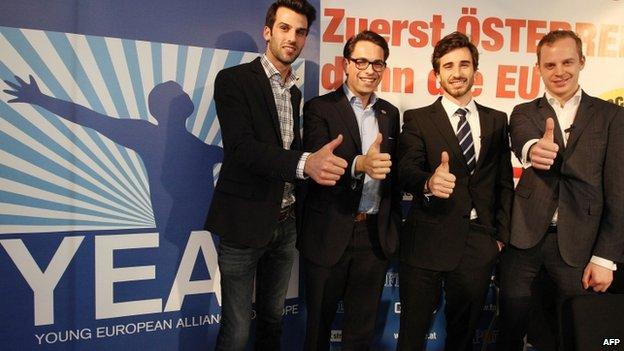Far-right youth movement seeks 'Europe of Fatherlands'
- Published

The launch of the Young European Alliance for Hope (YEAH) was overshadowed by controversial remarks
Are relations between far-right Eurosceptic parties improving?
Traditionally such parties have been fragmented in Europe, as they tend to campaign on national issues, rejecting EU integration and the weakening of national sovereignty.
But now, with support for the far-right rising, four parties - France's National Front (FN), Austria's Freedom Party (FPOe), Belgium's Vlaams Belang and the Sweden Democrats - have joined up to form a European youth movement.
It is called Young European Alliance for Hope, or YEAH.
It follows a decision last year by National Front leader Marine Le Pen and the Eurosceptic Dutch politician Geert Wilders to form a loose alliance for the European elections, which they are hoping could evolve into an official group in the European Parliament - if other like-minded parties join them.
'Europe of Fatherlands'
However, Mr Wilders' Freedom Party (PVV) is not represented in YEAH.
When asked why the PVV or Italy's Northern League or Britain's UKIP had not signed up to the alliance, Udo Landbauer from Austria's FPOe said trust takes time to develop. He is running as a candidate for the European Parliament.
At the launch in Vienna, the talk was of uniting to create a Europe of Fatherlands, rather than a United States of Europe.
But the launch was overshadowed by controversial comments by the FPOe's top candidate for MEP, Andreas Moelzer, in which he compared EU bureaucracy unfavourably with Hitler's Third Reich and was also quoted as saying the EU was in danger of turning into a "conglomerate of Negroes".
Mr Moelzer, who admits to the first comment but can't remember saying the second, has issued an apology.
But a member of the Sweden Democrats, Kent Ekeroth, said in a newspaper interview that such statements were intolerable and put into question a future EU parliamentary group with the Freedom Party.